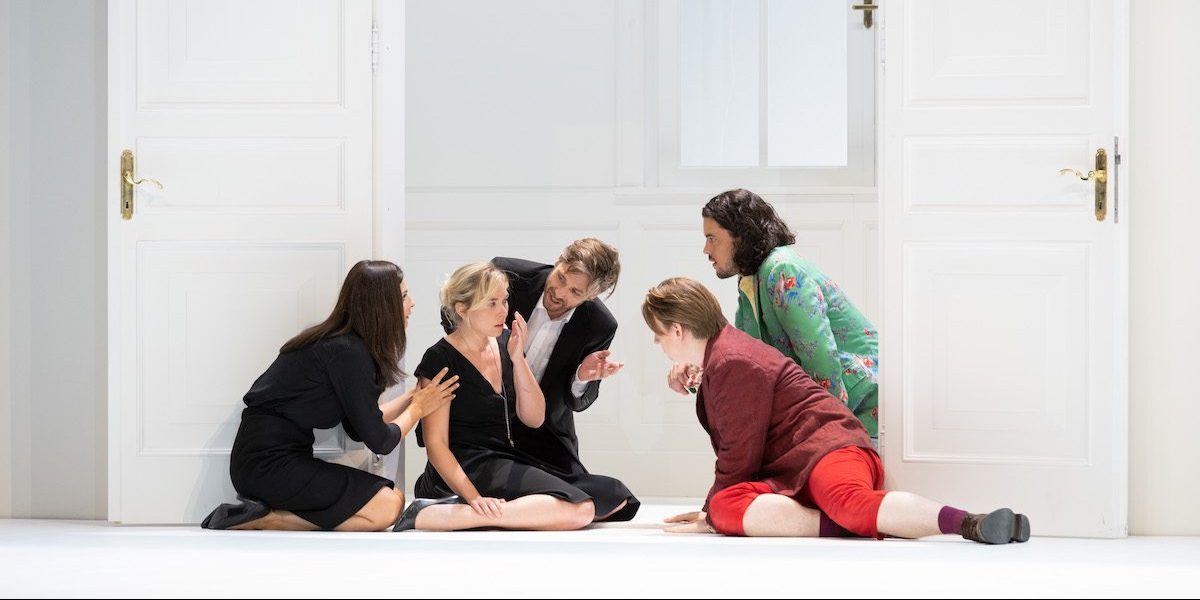The current production of Così fan Tutte at the 2020 Salzburg festival was already staged last year with some cuts to the original score in order to comply with the health requirements due to the pandemic: a maximum length of 2.5 hours and no interval. This year the same production has been revived with the original cast, except for a last-minute substitution of an indisposed Johannes Martin Kränzle with Michael Nagy in the role Don Alfonso.
The Cosi fan Tutte plot has been considered by many to be the weakest of the trilogy of operas by Mozart and Da Ponte especially when compared to the more complex opera Don Giovanni, which the 19th-century audiences thought was the most profound. However, once one scratches the light surface of the opera buffa, one discovers insights of great depth into the human psychology of love, passion, and commitment.
One interpretation of the plot orchestrated by Don Alfonso is that it is more than just a cynical game at the expense of the two couples of lovers: Don Alfonso is seen as, in reality, an old man helping his younger friends better to understand the nature of love. The complete title of this wonderful stage work is in fact Cosi fan Tutte: ovvero la scuola degli amanti (All Women Do It: or the school of lovers), and this school is really painful leaving at the end the four characters in great distress and having to face new understanding.
In actual fact, this opera shows the complexity of love as it is with all the bright and dark sides, the attraction and the repulsion, the jealousy and the forgiveness, the doubts, and the certainties. Only Mozart’s genius could handle this impossible libretto mixing the farcical elements with a vast palette of human passions, and he achieves this with a score full of nuances and beauty that makes this artificial plot look realistic.
All these contrasting elements are clearly on display in Christof Loy’s direction. The staging is just a white wall on a black background, two doors, the characters wear contemporary black and white dresses or garish clothes when in disguise. They act like everyday folks engaging the public in a very energetic and fresh way; however, their constant motion on the stage creates a state of relentless tension throughout the performance.
The most striking feature of this production is, indeed, its extreme minimalism of design and even staging. Christof Loy demonstrates effectively that less is more and that reducing the staging to the bare essentials doesn’t disrupt an opera, on the contrary, the music and the acting gain in intensity.
The whole cast gives an excellent performance. The tenor Bogdan Volkov in the role of Ferrando has a bright voice, light and well projected, ideal for Mozart’s roles. His counterpart Guglielmo is interpreted by the baritone André Schuen who gives a very convincing portrayal of this character ranging from cockiness to jealousy. Michael Nagy’s role as Don Alfonso appears a bit too serious and constrained but it is sung aptly, whereas Lea Desandre brings a witty comedy to the role of Despina. However, is with Marianne Crebassa and Elsa Dreisig, interpreting respectively the two sisters Dorabella and Fiordiligi, that the singing reaches its highest point. Crebassa’s powerful dark pitch blends perfectly with Dreisig’s bright soprano voice. Their duets are mesmerising. Moreover, Dreisig captivates the audience with her perfect legato lines, her agility in the virtuoso passages, the easiness with which she achieves the huge leaps of the aria Come scoglio and later gives a very tormented and sympathetic portrayal of her character, especially in the aria Per pieta bel idol mio.
Magic also happens in the pit, not least because for the first time a woman is leading an opera series at this festival. Her conducting is lively, nuanced, never overpowering, and in keeping with the mood of the production.
Not to be missed.

